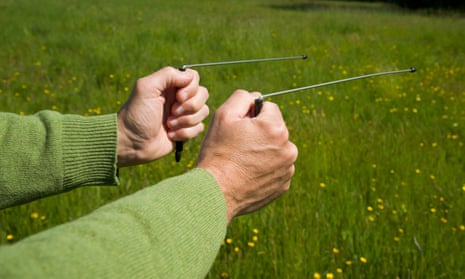Ten of the 12 water companies in the UK have admitted they are still using the practice of water dowsing despite the lack of scientific evidence for its effectiveness.
The disclosure has prompted calls for the regulator to stop companies passing the cost of a discredited medieval practice on to their customers. Ofwat said any firm failing to meet its commitments to customers faced a financial penalty.
Dowsers, or water witchers, claim that their divining rods cross over when the presence of water is detected below ground. It is regarded as a pseudoscience, after numerous studies showed it was no better than chance at finding water.
Some water companies, however, insisted the practice could be as effective as modern methods.
The discovery that firms were still using water diviners was made by the science blogger Sally Le Page, after her parents reported seeing an engineer from Severn Trent “walking around holding two bent tent pegs to locate a pipe” near their home in Stratford-upon-Avon.
Le Page asked Severn Trent why it was still using divining rods to find pipes when there was no evidence that it worked.
Replying on Twitter, the company said: “We’ve found that some of the older methods are just as effective than the new ones, but we do use drones as well, and now satellites.”
We've found that some of the older methods are just as effective than the new ones, but we do use drones as well, and now satellites. You can find more information here: https://t.co/zQKlQGl6no
— Severn Trent (@stwater) November 20, 2017
Le Page then asked the other 11 water companies whether they were using water dowsing.
Only one, Wessex Water, said it did not use divining rods, and one, Northern Ireland Water had yet to reply. The other nine confirmed the practice was still used in some form in their areas.
Christopher Hassall, a specialist in water management at the Leeds University school of biology, said: “This isn’t a technique, it’s witchcraft.”
He told the Guardian: “We work with water companies to enhance the sustainability of drinking water supplies and it is frustrating that there are still some very peculiar practices that are going on in these companies.”
He called for Ofwat to eradicate the practice.
“The statutory bodies need to be stepping in. It is analogous to using homeopathy and reiki on the NHS. These are unproven practices that waste time and money.
“Drinking water is a fundamental human necessity and something that the water companies should be managing as effectively and efficiently as possible without using these medieval witchcraft practices.”
He added: “If they are going to be passing the charges on to us for using dubious practices, then that’s something everyone in the UK should be concerned about.”
Le Page said she was surprised by the finding. “Ofwat should be looking into this because it’s a total waste of money. It’s not going to do any harm. But sending out somebody off to a location just to wave some sticks around is not a good use of time or money.”
An Ofwat spokesman urged companies to consider the cost-effectiveness of techniques used to stop leaks.
He said customers wanted to see a meaningful reduction in leakage and companies were required to agree specific leakage commitments in consultation with clients.
“While it is ultimately a decision for each individual company how they deliver on those commitments, we expect them all to think very carefully about whether they are using the most efficient and cost-effective tools and resources,” the spokesman said.
“Ultimately, any company which fails to deliver on the commitments it has made to its customers will face a financial penalty.”
A spokesman for the sector’s trade body, Water UK, said: “Water companies are spending millions of pounds each year on innovative leakage detection schemes which has helped reduce leakages by a third since the 1990s, and it’s unlikely that a few individuals doing some unofficial divining has had much impact.”
Le Page said those convinced by dowsing were being fooled by the “ideomotor effect”, a phenomenon observed when the act of thinking about something unconsciously triggers the muscles to move, and in this case, prompts divining rods to cross.
“It so convincing when you do it, and you see the rods cross over, you really don’t realise that you are one the causing it,” she said.
Anglia Water was the firm that was most insistent about the effectiveness of dowsing rods, inviting Le Page to a demonstration.
If you've ever tried to find a water pipe underground then you'll know that it can be very difficult you will try anything. We're happy to take you out and demonstrate, let us know and we can arrange. We'll even make a film and post it on our social channels putting both sides!
— Anglian Water (@AnglianWater) November 21, 2017
The other companies, including Welsh Water, Scottish Water, South West Water, Southern Water and United Utilities, all confirmed the continuing use of some form of dowsing in tweets.
Hi @domneill, although few and far between, some of our techs still use them! But they are only used to detect pipework and voids that may be caused by bursts or collapses! pic.twitter.com/UueOG3zj9U
— Yorkshire Water (@YorkshireWater) November 20, 2017
Hi Sally, we don’t use them as part of training for our teams or as an official recognised tool for them BUT our field services manager tells me he’s seen them used successfully before! Hope that helps 😊💙💧
— Northumbrian Water (@NorthumbrianH2O) November 21, 2017
Hi Sally, sorry about the delay. Some of our techs do on occasion use dowsing rods 1/2
— Thames Water (@thameswater) November 21, 2017
however, we also have access to a wider range of accurate technology, which most techs find preferable 2/2 - Tom
— Thames Water (@thameswater) November 21, 2017
Le Page questioned how the methods could still be in use given the evidence available that they did not work. Writing on her blog, she said: “Every properly conducted scientific test of water dowsing has found it no better than chance (eg here, here, and here, nicely described here).
“You’ll be just as likely to find water by going out and taking a good guess as you will by walking around with divining rods.”










